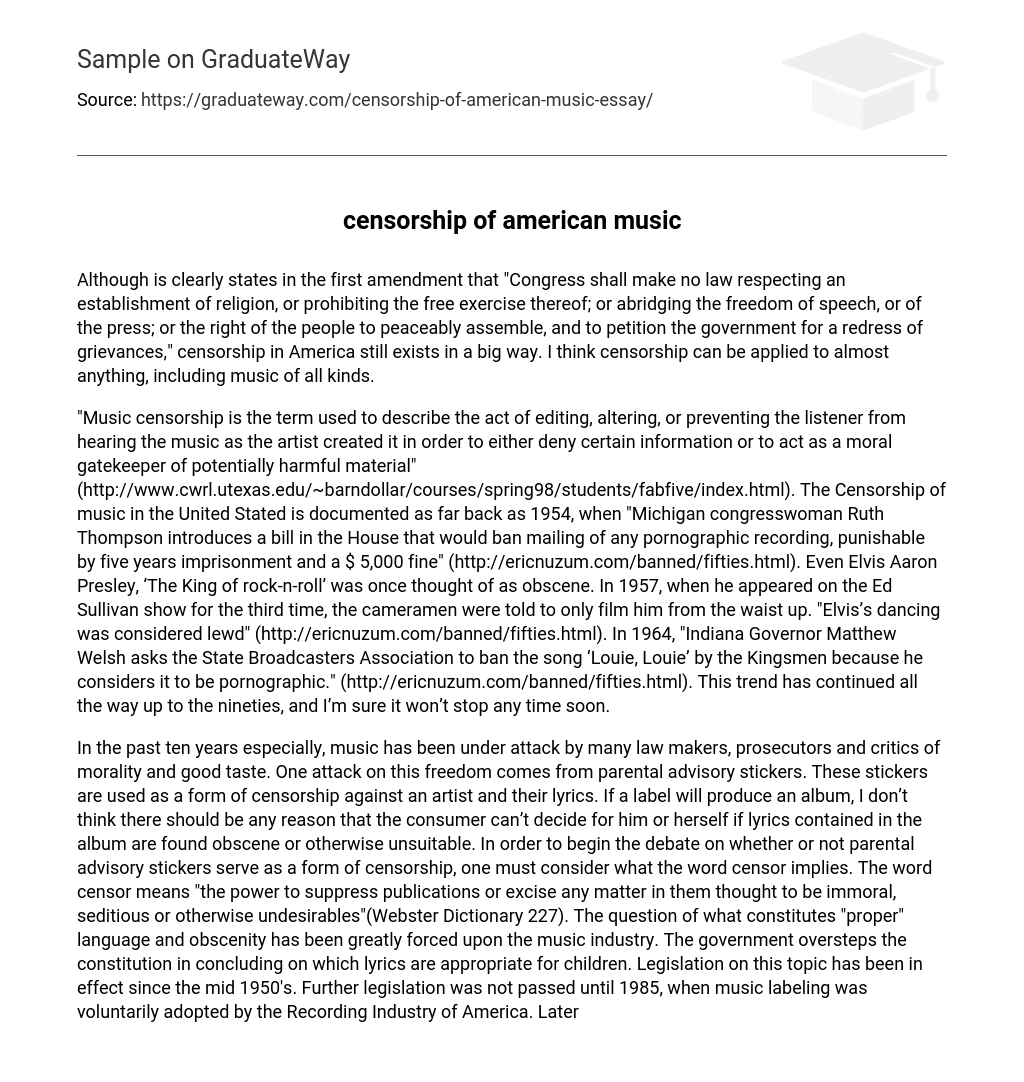Despite the clear prohibition in the first amendment against Congress creating laws that hinder religious freedom, freedom of speech and the press, peaceful assembly, and the right to petition the government for grievances, censorship remains prevalent in America. This type of restriction is relevant to different areas, including music.
Music censorship is the act of altering or preventing listeners from hearing music as intended by the artist, either to withhold certain information or serve as a moral gatekeeper for potentially harmful material (source). The United States has a history of censoring music, dating back to 1954 when Congresswoman Ruth Thompson introduced a bill in the House that aimed to prohibit the mailing of pornographic recordings, punishable by imprisonment and a fine of $5,000 (source). Even Elvis Aaron Presley, known as ‘The King of rock-n-roll,’ faced accusations of obscenity. During his third appearance on the Ed Sullivan show in 1957, cameramen were instructed to only film him from the waist up because his dancing was considered lewd (source). In 1964, Indiana Governor Matthew Welsh urged the State Broadcasters Association to ban “Louie, Louie” by the Kingsmen due to its alleged pornography content(source). This trend continued into the nineties and shows no signs of stopping anytime soon.
Over the past decade, music has faced criticism and opposition from various lawmakers, prosecutors, and moral critics. One form of attack is the use of parental advisory stickers, which function as a means of censoring artists and their lyrics. I believe that consumers should have the freedom to decide for themselves whether the lyrics in an album are explicit or unsuitable. To discuss whether parental advisory stickers amount to censorship, it is important to understand the concept of censorship itself. According to the Webster Dictionary, censorship refers to the power to suppress or remove immoral, seditious, or undesirable content from publications. The issue of determining what qualifies as “appropriate” language and obscenity has heavily impacted the music industry. The government’s involvement in determining which lyrics are suitable for children can be seen as a violation of constitutional rights. Legislation regarding this matter has been in place since the 1950s, with further regulations implemented in 1985 when the Recording Industry of America introduced voluntary music labeling. In 1990, standardized guidelines were established for logo size, placement, and wording. The current labeling features a black and white logo affixed to the permanent packaging in the bottom right corner.
Parental advisory stickers are widely debated, but they essentially serve as a form of censorship that affects the availability of certain music recordings. Music stores increasingly limit access to offensive works, as seen in 1992 when Ice T’s “Cop Killer” was removed from future albums and existing albums were recalled. This led to approximately 1,400 stores ceasing sales of the album. Major retailers like Woolworth’s and K-mart refused to purchase or display albums with parental advisory stickers. While these labels don’t legally ban sales, they are often viewed as disguised censorship rather than consumer information. It’s important to remember that the First Amendment protects artistic creations, even if they contain explicit content or express unpopular viewpoints. Imposing restrictions on free speech reflect personal moral beliefs imposed on society at large. Personally, I strongly support the freedom to choose the music I want to listen to.The Parents Music Resource Center (P.M.R.C.) advocates for a public discussion on the inclusion of violence, racism, mistreatment of women, and glorification of drugs and alcohol in music. They aim to restrict access to explicit lyrical content about sex, drugs, alcohol, murder or suicide for underage individuals. It is interesting to note that even the Bible itself may require a parental advisory sticker considering its depictions of crucifixions, stonings, and other forms of punishment. Moreover, it is crucial to recognize that there is no conclusive evidence establishing a direct correlation between exposure to explicit sexual content and antisocial behavior or sexual violence.
There are various organizations that have emerged in reaction to the Parent’s Music Resource Center. Parents of Rock and Rap is one such group, advocating for freedom of expression. Its members consist of students from different age groups, parents, grandparents, college professors, and musicians.
Consumers currently have the responsibility of addressing concerns, regardless of their stance on the issue. According to Zeinert (27), restricting objectionable recordings is a form of censorship. It is crucial to thoroughly examine the entire system, including past court rulings and decisions concerning the music industry and protecting children from inappropriate content. We need to question if it aligns with our constitutional ethics and consider modifying the warning system to safeguard our guaranteed freedoms. Personally, I firmly believe that all types of censorship are unfair; however, this does not mean they lack purpose in specific situations. Ultimately, each individual has the decision-making power.
Hull, Mary. Censorship in America. Santa Barbara, California: ABC-CLIO, 1999. 23.
Winfield, Betty Houchin. Bleep! : Censoring Rock and Rap Music. Greenwood Publishing Group, 1999.
Zeinert, Karen. Free Speech: From Newspapers to Music Lyrics. Enslow Publishers, Incorporation. 1995.





